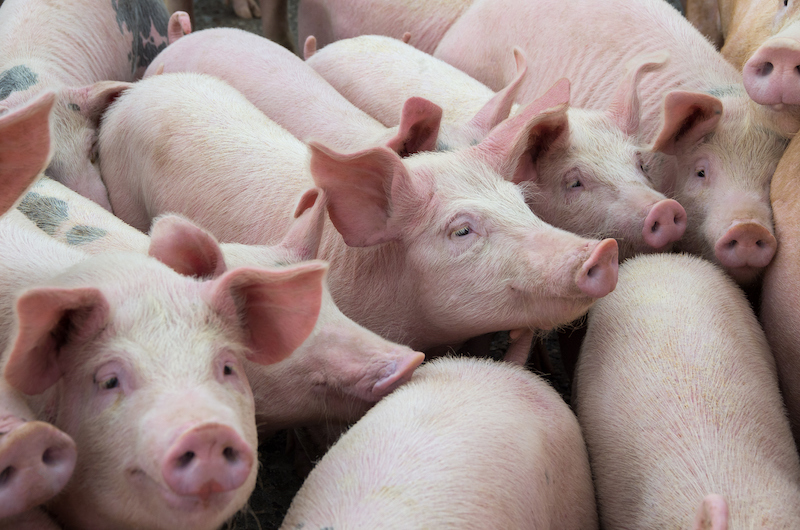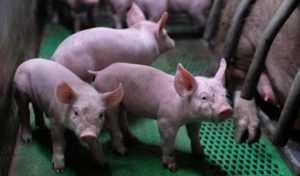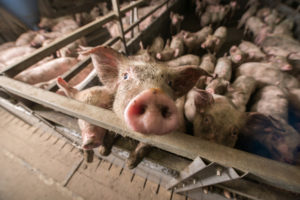
The U.S. Supreme Court faces choices in deciding a case pivotal to state regulation and interstate commerce.
Last month, the U.S. Supreme Court heard oral arguments in a case that could prove pivotal to the future of regulation and interstate commerce in the United States. In National Pork Producers Council v. Ross, the Court is reviewing a Ninth Circuit decision dismissing a challenge to California’s Proposition 12. That proposition banned the sale of pork products from animals that were raised under conditions that California voters consider “cruel”—regardless of the state where the animals were located and the pork products were produced.
The easiest way to understand National Pork, which we describe in an earlier essay, is that it asks the question: “What limits, if any, does the dormant Commerce Clause, or the U.S. Constitution more generally, impose on states’ ability to regulate for morality when significant impacts of that regulation are felt outside the state?”
Although there are precedential arguments both for upholding and striking Proposition 12, if the Supreme Court approves California’s far-reaching regulation, few limits would remain on states’ ability to act on moral grounds to impede trade with other states. It would also imply that U.S internal law provides a starkly different approach to this cross-border issue than do both international trade law and accepted practice in other common markets. Both trade and common-market law, both of which have devoted substantial attention to similar questions—have adopted regimes that likely would forbid California’s regulation.
As we describe in a forthcoming academic article, “Bibb Balancing,” Proposition 12 imposes a mismatch burden. Mismatch burdens arise from the interaction of two or more states’ different rules. In a federal system in which states have autonomy, regulatory diversity is expected. The question is whether there is a point at which such diversity becomes so burdensome that it impermissibly segments—or in the words of the Court, balkanizes—the national marketplace. Mismatch cases also raise a closely related but conceptually distinct issue. Specifically, because mismatched regulations spill over into other states, they hamper other states’ abilities to regulate in their own territory. Thus, when California requires pork sold in its territory to meet certain production processes, the impact of that regulation spills over into other states, such as Iowa and North Carolina, which have their own regulations about how hogs should be raised.
It is not clear under the Supreme Court’s precedent how—or even if—courts should resolve mismatches. The Court at oral argument wrestled with this issue. For example, Justice Neil Gorsuch expressed uneasiness with the type of balancing typically called for in undue burden cases.
But the role of the dormant Commerce Clause long has been to mediate between state policy priorities, on the one hand, and federalism and national market interests, on the other. Proposition 12 implicates that tension because it rests on California’s claim that it is entitled to ban products from out-of-state because its citizens have ethical objections to the process used to make those products.
Setting aside the issue of whether it is appropriate for courts to intervene to resolve mismatch cases, our purpose here is to consider four ways mismatch cases could be handled, ordered from the most to the least deferential to the importing state—here, California. This order is also, necessarily, inversely deferential to the exporting state and the national marketplace.
First, the Supreme Court could, as Justice Clarence Thomas advocates, eliminate dormant Commerce Clause review. Alternatively, as the late Justice Antonin Scalia advocated, the Court could eliminate the undue-burden strand of the doctrine, leaving only the prohibition against discrimination. Such an approach closely follows Donald Regan’s argument that all the Supreme Court does, and all it should do, in dormant Commerce Clause cases is smoke out intentional protectionism.
Given the facts underlying the National Pork case, it seems unlikely that the Court would find intentional protectionism—at least as to pork because there is essentially no commercial hog farming in California. Instead, if the Court suspects protectionism more broadly in Proposition 12—which also prohibits the sale of caged eggs, and California is a large producer of eggs—it likely would remand the case on that issue. Focusing on intent has an obvious appeal: Where intent is clear, the reviewing court need not balance. But there are also problems, which include limiting court review and determining whether the challenged state is engaging in intentional protectionism. In addition to judicial reluctance to attribute unconstitutional intent to states, there are many circumstances where intent is unclear. In addition, numerous problems plague the process of ascribing a single intent to a law, and uncovering intent can be difficult, especially given the incentives to hide it. These difficulties weigh against deciding dormant Commerce Clause cases on the basis of intent alone.
Second, rather than cutting back on undue burdens, the Court might maintain the status quo of balancing. Much of oral argument assumed this would be the correct approach. For balancing, the Court must analyze the preliminary question of whether the Court should accept moral opprobrium of out-of-state practices as a legitimate state interest that could weigh against a burden on interstate commerce as part of the balancing test. And assuming that the Court does accept such ethical concerns, it must consider a closely related question of when, if ever, is the connection between the moral objection and the product too “attenuated” to count.
Without clear limits, expanding acceptable justifications for process-based embargoes to include morality would give importing states wide latitude to push their preferred policies into the territories of other states. The elephant in the room was whether a state could ban products from other states because those other states permitted or forbade abortions or whether a state could even ban abortion pills. But questions the justices raised—concerning whether states could ban products made by labor that has not been paid a certain minimum wage or lacked access to certain health care benefits that the importing state’s voters considered moral minimums—show just how much an importing state could exclude if it were permitted to ban products on the basis of morals alone.
A third approach would draw upon multilateral trade rules. Those rules include a requirement of “national treatment” that prohibits members from using internal laws, taxes, and non-tax regulations to discriminate against imports that are “like” domestic goods. The rules define an imported product as “like” a domestic product if it is “a directly competitive or substitutable product.”
The idea behind the national-treatment and like-product concepts is that a state should not be able to enact a facially neutral rule that invidiously discriminates against a foreign product. As a result, if the permitted product and the banned product are sufficiently alike, the trade rules demand that the importing state treat them the same way.
For example, in a decision known as Tuna I, a trade tribunal found that the United States violated the national treatment standard when it banned imports of tuna from Mexico and other countries that were caught using methods that killed more dolphins than U.S. standards allowed. The tuna that the United States banned was determined to be “like” the dolphin-safe tuna that the United States allowed.
If the Supreme Court adopted a principle analogous to national treatment for like products, states would be prohibited from using narrow distinctions to differentiate among products. Thus, California could not ban pork from gestation crates because caged pork and cage-free pork are like products, which is to say directly competitive and substitutable.
Finally, a fourth potential solution to mismatch cases would be for the Supreme Court to follow the Court of Justice of the European Union (CJEU), which interprets a treaty regime that—like the U.S. Constitution—protects both state regulatory autonomy and a multistate market for goods and services.
The case of Cassis de Dijon involved a clash between France’s requirement that fruit liqueurs contain at most 20 percent alcohol and Germany’s requirement that such liqueurs contain at least 25 percent alcohol. To resolve the conflict, the CJEU developed the principle of “mutual recognition,” under which products that comply with the regulation of their state of manufacture are putatively free to circulate in all other EU states.
Mutual recognition relies on a crucial assumption, namely that there is sufficient similarity between the policy goals of the importing state and the manufacturing state that the former can rely on the latter’s regulation to protect its reasonable interests. But if the importing state can point to an important state interest that is not addressed by the manufacturing state’s rule, then the importing state may apply its own rule. To avoid unraveling the benefits of mutual recognition, however, the CJEU construes this exception narrowly.
Similar to the national-treatment principle, a mutual-recognition rule would also create a legal presumption that the importing state must allow the product. Thus, it would be harder for importing states to ban out-of-state products, such as pork, merely because they use different production methods.
In National Pork, out-of-state producers have challenged whether California can ban imports of their pork products because Californians have moral objection to the other states’ production processes. If the Supreme Court permits California to justify process-based embargoes on moral grounds, it will have handed the states the power to use access to their consumer markets as leverage to promote their preferred policies around the country. Such a decision would empower large states relative to small ones. In deciding whether to allow states, especially California, to exert this power, the Court will need to choose from among several alternative ways of addressing that issue. Each of the alternatives presented here would handle the problem differently, with sharply different impacts on both regulation and interstate commerce.





